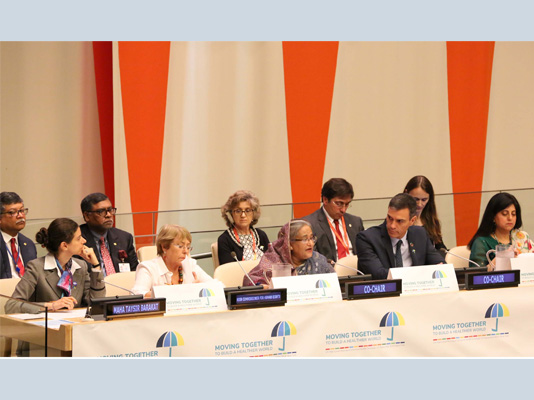NEW YORK, Sept 23, 2019 (BSS) – Prime Minister Sheikh Hasina here today put emphasis on forging regional and global collaborations among countries to achieve Universal Health Coverage (UHC).
“I believe, collaboration among countries at regional and global levels will be fundamental to accelerate progress for a common goal to achieve Universal Health Coverage,” she said.
Sheikh Hasina also said effective global partnership to formulate healthcare financing strategy for each country could be important to achieve UHC and SDGs by 2030.
The prime minister was co-chairing an event titled ‘Multi-stakeholder Panel in parallel to the High-level meeting on Universal Health Coverage (UHC)’ at the ECOSOC Chamber in the UN Headquarters here.
Spanish Prime Minister Pedro Sanchez also co-chaired the event with the theme ‘UHC as driver of equity, inclusive development and prosperity for all’.
The panelists of the event were Ms. Michelle Bachelet, United Nations High Commissioner for Human Rights; Ms. Maha Taysir Barakat, Chair of the Board of the RBM Partnership to End Malaria; Ms. Winnie Byanyima, Executive Director of Oxfam International; and Mr. Jeffery Sachs, Professor and Director, Center for Sustainable Development, Colombia University.
“Resource mobilization to ensure health security under Universal Health Coverage is a fundamental obstacle in many countries,” the prime minister said.
Sheikh Hasina said as stated in the Universal Declaration of Human Rights, everyone has the rights to a standard of living adequate for the health and well-being.
“In fact, enjoyment of health is one of the fundamental rights of every human being without distinction of race, religion, political belief, and economic or social conditions,” she said.
The prime minister said inclusive development and prosperity mean two things. “First, irrespective of his/her social background, everyone must get equal opportunity. And secondly, everyone must have equal access to the common benefit and resources,” she said.
Sheikh Hasina said lack of equity and absence of inclusive development may bring political instability and serious erosion of social cohesion.
“We now see that only generating growth and creating wealth are not enough for progress and well-being unless the access to and distribution of the wealth are just and proper,” she said.
“We have found out that securing universal health coverage is one of the pre-conditions for establishing a righteous and fair society as our health equates to our existence,” the prime minister continued.
About 100 million people, she mentioned, are pushed into extreme poverty each year because of health expenses, and 800 million people spend at least 10 per cent or more of their household budget on healthcare expenses.
The prime minister said the poor people often cannot get services from privately-owned healthcare providers resulting in grave insecurity in maintaining their lives and livelihoods.
Sheikh Hasina said the equity in healthcare services could be ensured through Universal Health Coverage-UHC by reaching the poorest segment of the society with affordable and efficient health services.
The prime minister said while adopting Agenda 2030 in 2015, the world committed that all individuals and communities should be able to receive essential health services and no one should be left behind.
Sheikh Hasina said the poor people often cannot get services from privately-owned healthcare providers resulting in grave insecurity in maintaining their lives and livelihoods.
She said the equity in healthcare services could be ensured through Universal Health Coverage-UHC by reaching to the poorest segment of the society with affordable and efficient health services.
“No one must be forced into poverty because of healthcare expenses. We will try to find the means and ways to avoid being poorer in health crisis situations,” she said.
The premier went on saying: “In fact, 90% of health needs can be met at the primary healthcare level.”
Sheikh Hasina said strong primary healthcare systems can be the first line of defense against communicable and non-communicable diseases and should be a priority for all countries working to deliver SDG 3.
The prime minister said her government has established about 14,000 ‘Community Clinics’ and Union Health Centers across the country to provide primary healthcare to rural people.
“On an average 40 patients take health services from each community clinic per day and 90% of them are women and children,” she said, adding more than 10 million visits are made to these community clinics every month.
Chairperson of Bangladesh National Advisory Committee for Autism and Neurodevelopmental Disorder Saima Wazed Hossain, Foreign Minister Dr AK Abdul Momen, Health Minister Zahid Maleque and former health advisor to the prime minister Prof Dr Modasser Ali were present at the event.



